| Srl | Item |
| 1 |
ID:
111039
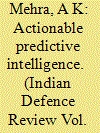

|
|
|
| 2 |
ID:
112042
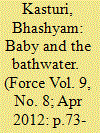

|
|
|
| 3 |
ID:
117952
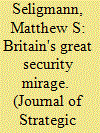

|
|
|
|
|
| Publication |
2012.
|
| Summary/Abstract |
This article focuses on the relationship between the threat perception analyses of the British Admiralty and the strategic orientation of the Royal Navy at the outset of the twentieth century. The current view is that this was an era when fear of France and Russia drove British naval policy. However, as this article will show, Britain's Naval Intelligence Department formed a low opinion of French and Russian naval capabilities at this time and this negative evaluation exerted considerable influence over decision making. The belief that, owing to multiple qualitative deficiencies, these powers could definitely be beaten in battle lessened the standing of the Franco-Russian naval challenge and freed the Admiralty to consider the danger posed by other possible enemies, most notably Germany.
|
|
|
|
|
|
|
|
|
|
|
|
|
|
|
|
| 4 |
ID:
121674
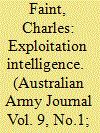

|
|
|
|
|
| Publication |
2012.
|
| Summary/Abstract |
Lessons learned by the United States in the global war on terror and in overseas contingency
operations underscore the value of intelligence information gleaned from the exploitation of
captured enemy personnel, equipment, and materiel. A key element of successful exploitation is accurately categorising information by intelligence discipline in order to apply the
correct resources towards the exploitation effort and maximize exploitation potential. In
light of these revelations, it is time to review the existing intelligence disciplines to determine
whether a new intelligence discipline- exploitation intelligence or 'EXINT'- should be added
to the disciplines currently in existence.
|
|
|
|
|
|
|
|
|
|
|
|
|
|
|
|
| 5 |
ID:
166778
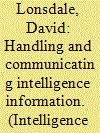

|
|
|
|
|
| Summary/Abstract |
Effective communication of information is essential to intelligence work. This paper identifies the main obstacles to good communication: policy-related challenges; cognitive impediments; resource limitations; cultural and structural issues within intelligence communities; and technical information. To illustrate, it examines four cases when poor communication contributed to intelligence shortcomings. Via questionnaire and document survey, the study identifies the current state of practice in UK intelligence communities. The survey of visualization documents currently in use revealed errors against established principles of Information Design. Thus, to ensure better handling and dissemination of intelligence, there is a distinct need to apply Information Design principles.
|
|
|
|
|
|
|
|
|
|
|
|
|
|
|
|
| 6 |
ID:
103770
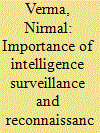

|
|
|
| 7 |
ID:
124000
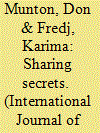

|
|
|
|
|
| Publication |
2013.
|
| Summary/Abstract |
During the lead-up to the 2003 invasion of Iraq, the governments of the United States and United Kingdom jointly made public a range of previously secret intelligence to bolster claims that Saddam Hussein's regime had continued to pursue development of weapons of mass destruction. Public releases of intelligence information are less rare than often assumed, but the Iraq case was definitely unusual in that both governments implicitly revealed their close cooperation.
|
|
|
|
|
|
|
|
|
|
|
|
|
|
|
|
| 8 |
ID:
149502
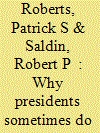

|
|
|
|
|
| Summary/Abstract |
PATRICK S. ROBERTS and ROBERT P. SALDIN identify reasons why presidents sometimes do not use intelligence information. They argue that presidents may opt for “opacity” so as not to act on intelligence information that could upset the global strategic balance or their foreign policy interests. They discuss this phenomenon using as a case study the alleged Israeli-South African nuclear test in 1979.
|
|
|
|
|
|
|
|
|
|
|
|
|
|
|
|
| 9 |
ID:
027256


|
|
|
|
|
| Publication |
London, WeidenFeld and Nicolson, 1985.
|
| Description |
xii, 404p.
|
| Standard Number |
0297787454
|
|
|
|
|
|
|
|
|
|
|
|
Copies: C:1/I:0,R:0,Q:0
Circulation
| Accession# | Call# | Current Location | Status | Policy | Location |
| 027124 | 327.12/LAQ 027124 | Main | On Shelf | General | |
|
|
|
|